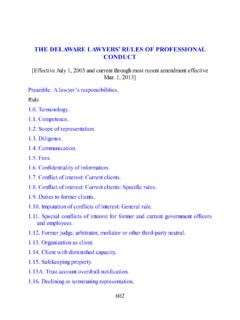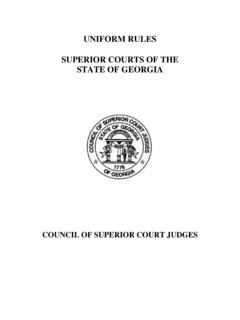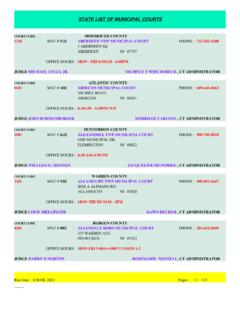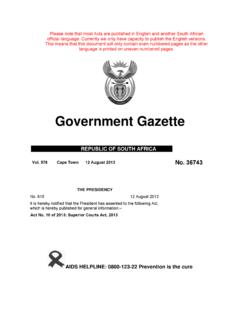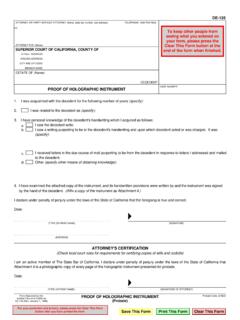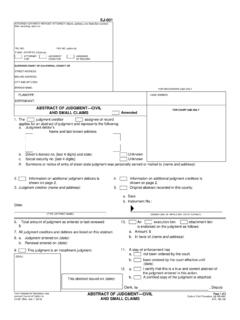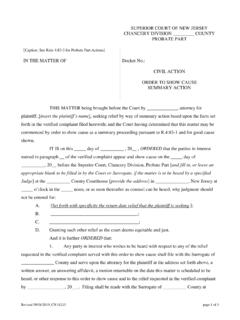Transcription of Superior Civil Rules 2016 - Delaware Courts
1 Rules OF Civil PROCEDURE FOR THE Superior court OF THE STATE OF Delaware I. SCOPE OF Rules ONE FORM OF ACTION. Rule 1. Scope and purpose of Rules . These Rules shall govern the procedure in the Superior court of the State of Delaware with the exceptions stated in Rule 81. They shall be construed and administered to secure the just, speedy and inexpensive determination of every proceeding. Rule 2. One form of action. There shall be one form of action to be known as " Civil action." II. COMMENCEMENT OF ACTION; SERVICE OF PROCESS, PLEADINGS, MOTIONS AND ORDERS; DEPOSIT AND SECURITY FOR COSTS. Rule 3. Commencement of action. (a) Complaint and praecipe.
2 -- Except amicable actions, an action is commenced by filing with the Prothonotary a complaint or, if required by statute, a petition or statement of claim, all hereafter to be referred to as a "complaint" and a praecipe directing the Prothonotary to issue the writ specified therein. Sufficient copies of the complaint shall be filed so that one copy can be served on each defendant as hereafter provided. An amicable action is commenced by filing an agreement specifying the matters agreed upon. Every newly filed complaint shall be accompanied by a Case Information Statement (CIS). The CIS form is used solely for administrative purposes and the information thereon has no legal effect on the action.
3 If any party objects to the Related Cases listed by another party in the CIS, the objecting party shall separately file a written objection with the Prothonotary no later than ten days after the last responsive pleading is filed. Any nonobjecting party may respond in writing within five days to any such objection. The Prothonotary shall forward any objection to the Related Cases, along with any response thereto, to the Civil Administrative Judge. The Civil Administrative Judge may, with prior approval of the President Judge, reassign the case to a different judge. (b) Actions pursuant to 10 Del. C. { 3901. -- In all actions upon bills, notes, bonds, or other instruments of writing for the payment of money, or for the recovery of book accounts, on foreign judgments and in all actions of scire facias on recognizances, judgments or mortgages, the plaintiff may make a specific notation upon the face of the complaint requiring the defendant or defendants to answer any or all allegations of the complaint by affidavit.}
4 (c) Appeals de novo. -- When an appeal de novo is permitted by law, an action is commenced in the Superior court by the appellant filing with the Prothonotary a praecipe within the time prescribed by statute for the filing of an appeal. If no time is prescribed by statute, the praecipe shall be filed within 15 days from the entry of the final judgment, order, or disposition from which an appeal is permitted by law. When the appellant is the party having the duty of filing the complaint or other first pleading on appeal, the appellant shall file such pleading with praecipe. When the appellee is the party having the duty of filing the complaint or other first pleading on appeal, the appellee shall serve a copy of such pleading within 20 days after service of the process on appeal, or if appellee has not been served, within 40 days after the date of the process, and thereafter the pleadings shall proceed as in other actions.
5 (d) Record; stay. -- The appellant shall file a certified copy of the record of the proceedings below, not including the evidence, within 10 days of the filing of the praecipe. Process shall not issue until the appellant has filed the record. There shall be no stay of execution or other proceedings below unless ordered by this court pursuant to Rule 62(c). (e) Deposit for costs. -- The Prothonotary shall not file any paper or record or docket any proceeding until the required deposit for costs and fees has been made. Before any Civil suit, action or other proceeding is instituted in the Superior court , the Prothonotary shall demand and receive the sum of $125, as a deposit of guaranty for the payment of the fees and costs in the Prothonotary's office, and the Prothonotary shall apply the sum of $125 from time to time in payment of such fees and costs in that office.
6 If the sum of $125 is expended in the payment of the fees and costs in the Prothonotary's office as the fees and costs accrue from time to time, the Prothonotary shall demand and receive a sufficient amount, which shall be necessary, in the Prothonotary's judgment, to defray the fees and costs for additional service or services before any such additional service or services shall be performed by the Prothonotary. This Rule shall not apply to any suit, action or other proceeding which is exempted by law from the requirement of a deposit for costs. A deposit of not less than $750 shall be required in every case where a special jury is requested. Before any third-party complaint is filed, the Prothonotary shall demand, and receive, from the party who filed it, the sum of $125 as a deposit of guaranty for the payment of the fees and costs in the Prothonotary's office arising out of the third-party complaint; and the Prothonotary shall apply the sum of $125 from time to time in payment of such fees and costs in that office.
7 If the sum of $125 is expended in the payment of such fees and costs as they accrue from time to time, the Prothonotary shall demand and receive from the filing party a sufficient amount which shall be necessary, in the Prothonotary's judgment, to defray the fees and costs for additional services with respect to the third-party complaint before any additional services shall be performed by the Prothonotary. (f) Security for costs. -- In every case in which the plaintiff is not at the time of filing the complaint a resident of the State, or being so, afterwards moves from the State, an order for security for costs may be entered upon motion after 5 days' notice to the plaintiff; in default of such security as provided in the order, the court , on motion, may dismiss the complaint.
8 (g) Application for deposit. -- In any proceeding in this court in which a party has deposited money as a guarantee for the payment of fees and costs in the Prothonotary's office, and it is thereafter finally determined that such party is entitled to recover such costs, the Prothonotary shall, for 60 days from the date of such determination, make demand for and make attempts to recover the costs from the party against whom they have been assessed, unless the court otherwise orders. If such costs are received, the Prothonotary shall apply them to the extent necessary to pay any costs unpaid and remit the balance to the party who made the deposit. If such costs are not received, the Prothonotary shall, at the end of said period, notify the party who made the deposit that recovery has not been made, and, at the same time, remit any balance to the depositing party.
9 The failure or inability of the Prothonotary to collect costs from the party against whom they have been assessed shall not constitute a waiver of the depositing party's right or the Prothonotary's right in its own behalf to attempt to recover the costs by appropriate proceedings. (h) Required expedited discovery in personal injury litigation. -- (1) In any action involving a claim for personal injuries, the plaintiff shall attach and file with the complaint the following: (I) Answers to interrogatories appearing in Superior court Civil Rule Form 30; (II) Photocopies of existing documentary evidence relating to special damages (or, in lieu thereof, a brief sworn statement as to any item not included as to the reason of its nonavailability and a specific undertaking as to when it will be made available).
10 (III) In any case in which lost wages or salary is claimed, photocopies of pertinent portions of the income tax returns of the plaintiff or plaintiffs for the past 3 years either (a) as an exhibit to the complaint, or (b) contained in a sealed envelope, or (c) a sworn statement that the copies of the returns are in the plaintiff's possession or have been applied for and a specific undertaking to supply them forthwith and without further request when an appearance is made on behalf of the defendant. (2) If a counterclaim, cross-claim, or third-party complaint for personal injuries is filed, the claimant shall be required to file with the claim that discovery which is required of a plaintiff in a claim for personal injuries.

